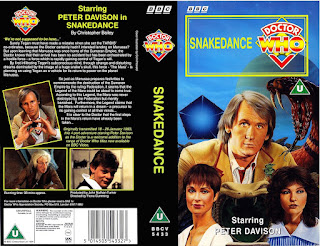We’re in the era of the pleasant, open faced one, Peter Davison, today, with tales of snakes and the solar winds...
It’s the one written by Kate Bush… according to an insane fan rumour for many years. Yeah, seriously, the actual writer of this one, Christopher Bailey, was so reclusive for many years, it was suggested that it was just the pen name of the singer-songwriter of Hounds of Love. Well, as a many years later interview in DWM proved he is real, and he contributed two absolute bangers. This first script of his, Kinda, is one of the most fascinating stories of the era, a powerful anti-colonialist tale about cultural assumptions about “primitive” cultures. It’s a story loaded with allegory and imagery, especially in the very well done dream sequences, something that Doctor Who rarely uses even to this day. What’s more, it introduced a truly unique villain in The Mara; less of a character, more of an idea personified, a concept of malice, of a form of self destruction in the form of a serpent (and it being a serpent in this wondrous garden of a world is I’m sure is yet more symbolism). It leads to some great double performances with the characters possessed by it, especially Janet Fielding who gets to do something very different to her usual performance as Tegan.
You know, whilst I’m here, screw it, it’s cheating a bit, but I’m going to talk about the immediate sequel, Snakedance, too. I think Snakedance is even better than Kinda, though it definitely needs the earlier story to lay the groundwork, as it takes some of those ideas from before and runs with them. It carries on the colonialist theme, this time showing a whole world and society being somewhat gentrified, which actually makes the Mara’s return that much easier as the old knowledge of how to beat it is in short supply. They also took note of how good Janet Fielding’s performance whilst under the Mara’s spell was, as we get far more of her in that mode in here, leading to some great moments, like the part one cliffhanger. And oh yeah, a young Martin Clunes is in this, but he’s actually pretty good in the part, with the oft shared embarrassing costume he wears towards the end actually working in context, as a sort of ceremonial dress. It’s a shame Bailey didn’t do much more for the show, as these stories have exactly the quality of pushing against the boundaries of what a Doctor Who story is that I always like to see. Still, he’s two for two, a good batting average, and he created a very memorable villain… I’d love to see New Who tackle the Mara, it’s one that I think could be pulled off well, and I’m not just talking about a more convincing snake this time.
Year 20: 1982 to 1983 - Enlightenment
A bit of a milestone this story, in that it’s the only Doctor Who serial in the whole classic run to have been both written and directed solely by women (Barbara Clegg and Fiona Cumming respectively, and by "solely" I mean that The Mark of the Rani would count if it wasn't co-written with Pip Baker). It’s a cracker of a story too, delivering on the wonderful image of literal space-ships; as I have kind of realised doing this list, as much as I enjoy Who in its proper SF moments, I also love more fantastical stories like this too. The main concept of the Eternals, as beings who, though having near immortality and being able to span so much of the cosmos, can only really appreciate things or feel anything by living vicariously is fascinating. There’s also a nice dose of social commentary, in terms of them often taking the form of upper classes, and playing games with the lives of those they see as “lesser”. The subplot with the Eternal Marriner being fascinated with Tegan is especially well done, as it’s a perfect metaphor for male entitlement.
It’s also the finale of the “Black Guardian” trilogy, where the villain of the Key to Time season tries to get his revenge on the Doctor, using the character of Turlough as his pawn. It’s easily the best of the three, not least for it being the one to tie into this storyline the best; given their natures, having the Guardians and the Eternals be connected is a no brainer. It’s also a great touch having the prize the Eternals are all racing towards be the way to effectively save Turlough’s soul… though at the same time it suggests the idea that just as the Eternals were playing with human lives, the Guardians are playing their own games with the Eternals and Time Lords. If you consider it as games all the way down, it certainly puts the quest for the Key to Time in a different perspective (also, godlike being playing games with mortals, that’s a neat idea, maybe a character like that should be in these new specials…).
BTW, whilst I’m here, I promised myself I would stay positive through Whovember, but I do just want to have a quick rant whilst I’m here. Barbara Clegg only wrote the one Who serial, but she did submit a couple of other concepts, both of which were adapted by Big Finish for their Lost Stories range, Point of Entry and The Elite, and both are highlights of the range. The stories themselves are great, and could have worked on TV back in the day. Now my brother has recently gone through all of the classic series, and I agree with him that the key figure in the decline of eighties Who was script editor Eric Saward. I think it says a lot about him that these fine storylines by Clegg were not put in front of cameras, but the likes of Warriors of the Deep, Timelash, and The Twin Dilemma were. In fact, The Elite in particular annoys me as it would have been a fine replacement for one of Saward's own scripts, but it might give too much away if I said which one. Still, at least her stories live on in audio, and the one that did make it to screen is a classic.
Next time, we have Davisons’ swansong, and a particularly meta moment for Colin Baker…




No comments:
Post a Comment